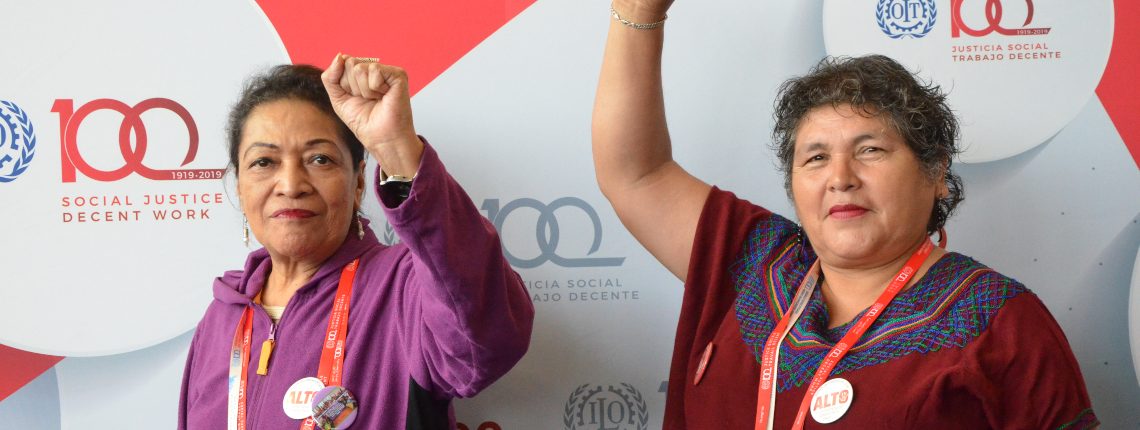In 2019, informal workers made some noise — in their home cities and at the highest global change-making bodies. They took to the streets, met with local officials and stood in front on the International Labour Organization in Geneva demanding to be seen, heard and, ultimately, treated with the respect and dignity they deserve as workers.
And they won.
We’ll look back at five important struggles for recognition in cities from Monrovia, Liberia, to Mexico City, Mexico, to Delhi, India. While workers achieved key advances in these cities, we’ll also look at how progress requires ongoing vigilance, as we will see from the setbacks faced by Bogotá’s waste pickers, whose model municipal payment system faced new challenges this year.
Informal workers’ efforts come at a pivotal moment in history. The world of work has undergone massive changes. Forget robots and automation — the harsh global reality is that the world’s workforce is now 61 per cent informally employed.
Today’s workers are in public spaces — sweeping, cleaning, selling — and struggling to earn a daily living with widespread hostility and evictions. Factory work has shifted, and millions of women across Asia, Africa and Latin America are working from their homes, often in cramped informal settlements, doing everything from stitching for global brands to assembling electronics. Whatever they do, they are almost entirely invisible to the outside world, despite the importance of their labour to families and communities.
It’s time laws and policies changed to meet this new world order. This demand has been front and centre for informal worker organizations in 2019. Armed with increasingly important statistical backings that provide better evidence of their existence and needs, informal workers have taken part in trainings on leadership, municipal budgets and urban planning exercises. Their improved organizational capacities have proven essential in important “wins” this year.
2019 has shown that progress is possible, but with nearly 2-billion workers in the informal economy, these achievements need to inspire more widespread global change — and a recognition that the future of work should be more human centred than robot obsessed.
Liberia’s street vendors pioneer new approach with city officials
By Sarah Orleans Reed and Mike Bird
Our popular series on street vendors this year exposed the pervasiveness of street vendor evictions in cities across the globe — from New York to New Delhi. For years, the situation in Liberia’s capital city of Monrovia was no different. That’s until street vendors in the city organized: they established the Federation of Petty Traders and Informal Workers Union of Liberia (FEPTIWUL)*; got savvy with their negotiation skills; gained the respect of officials; and, in 2018, worked with the municipality to devise a pioneering approach that includes street trade as part of the city’s future. Read more.
New international labour standard will help protect vulnerable workers from violence and harassment
By Leslie Vryenhoek with Karin Pape and Rachel Moussié
Organizations of informal workers gained an important victory at the highest level this year. The International Labour Conference (ILC) voted in June to adopt Convention 190 on Ending Violence and Harassment in the World of Work (C190). This marks a significant victory for informal workers — especially women — whose organizations advocated tirelessly to ensure this Convention addresses the realities of some of the world’s most vulnerable workers. Read more about this important achievement.
“I, Too, am Delhi”: People’s Campaign Calls for Inclusion in Indian Capital’s Master Plan
By Shalini Sinha and Malavika Narayan
In India’s capital city, informal workers are demanding their needs be part of the city’s future. Delhi, the country’s capital, is preparing its roadmap for the future — a new master planning document that sets out the city’s vision for the next two decades, until 2041. The major planning exercise not only maps what the city will look like but also, in theory, takes stock of the current reality. Intervening in the plan through the lens of livelihood could be a game-changer for Delhi’s future. Including the excluded will make the city more livable for everyone. Read this article and a related op-ed in Scroll.in.
Evicted: How Mexico City’s Shoe Shiners Fought Displacement and Challenged “Future” Cities
By Carlin Carr
Shoe shiners in Mexico City have worked in Glorieta de Insurgentes Square for decades to earn their livelihoods. When they were unceremoniously evicted by the municipality under the guise of modernization, they decided to fight back. Read this inspiring story.
In Colombia, a Global Model for Inclusive Recycling is under Threat
By Federico Parra
The tenuous situation in Bogotá reminds us that progress is complicated and not a straight path. The city has been hailed as a global model for waste-picker integration, and has made major progress in validating waste pickers’ work in the city through a formal payment system. However, the promising model has faced adversity this year. We are including this article in our “success” stories for the year as a reminder that informal workers are in a constant battle for their basic rights as workers. Read more.
Feature photo: Domestic workers attend the International Labour Conference in Geneva Switzerland. Photo: Sofia Trevino
